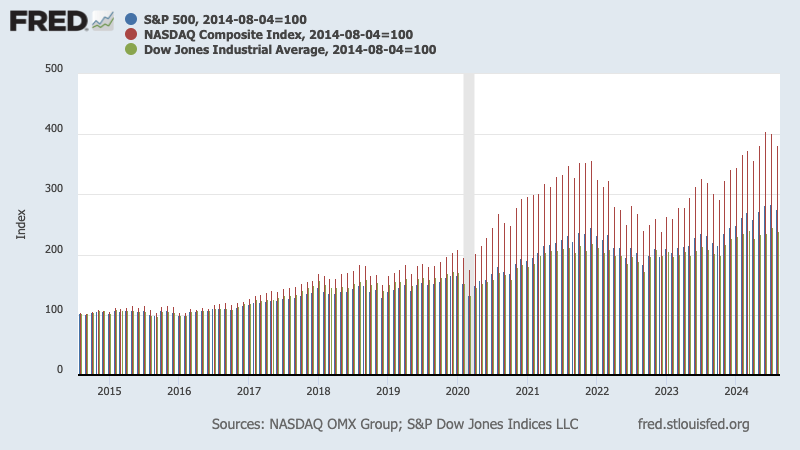Specialist Dilip Patel works at his post on the floor of the New York Stock Exchange, Monday, Aug. 5, 2024. Nearly everything on Wall Street is tumbling as fear about a slowing U.S. economy worsens and sets off another sell-off for financial markets around the world.(AP Photo/Richard Drew)
If you thought good times were forever, economically speaking, an official wake-up call has been issued.
Stock markets around the globe took a beating Monday, Aug. 5. It seems investors finally figured out the business cycle is slowing.
The venerable Dow Jones 30-stock index suffered a rare four-figure loss, dropping 1,033 points, or 2.6%. The S&P 500-stock index dropped 3% – the worst loss slip since September 2022, shortly after the Federal Reserve announced it would battle the worst bout of inflation in four decades with economic-chilling higher interest rates.
Until recently, stock traders mostly chose to ignore the likelihood that pricier financing would dull business prospects. Stock markets merely slipped below early summer’s record heights until a sell-off that started Friday exploded on Monday.
Stocks throughout 2024 were awarded lofty valuations based on a best-case scenario in which the Fed pulled off a “soft landing” that iced inflation without seriously damaging the economy. Suddenly, thoughts about other outcomes – including a recession – are dominating the investment mindset.
Here’s a look at key catalysts in this market turmoil ….
Weak job market: Hiring patterns have been an economic warning signal for months.
Last Friday, we learned that skittish bosses pushed the U.S. unemployment rate to 4.3% in July, the highest since October 2021. It was no shock because how long could the post-pandemic hiring spree really last?
The nation’s jobless rate surge comes after a record-setting, 22-month dip below 4%. And California’s not immune – its unemployment was 5.2% in June, the 10th month above 5% after hitting a record low of 3.8% in August 2022.
Crazed expectations: Note that 49% of consumers told Conference Board pollsters in July that stocks were going higher in the next six months.
That was a clear sign of over-exuberance. It’s the third-highest reading in a monthly survey dating to 1987 behind January 2018 and March 2024. On average, 36% are bullish on stocks during the past 37 years.
Curiously, the economic confidence of these same stock-loving shoppers was down 11% in a year nationwide, and down 18% in California. That’s a serious red flag.
A Japanese problem: Monday’s trading fiasco began in Tokyo, where the key stock index crashed 13%, its worst drop since a 2011 nuclear plant meltdown spooked investors.
Now, Japan may be an anomaly. Last week, its economy was rocked by a surprise rate hike by its Fed, the Bank of Japan. And it’s had long-running stock jitters, as this market didn’t fully recover from an early 1990s crash until earlier this year.
Technical weakness: The Nasdaq stock index, a Wall Street benchmark for the California-centric technology industry, fell 3.4% to its lowest level since May.
Now a handful of tech stocks have skyrocketed behind the promise of artificial intelligence. Yet, hints of tech weakness have dribbled out in recent months in the form of repeated layoffs by numerous tech companies.
But what’s next for tech will be significant to the overall stock market, as well as the national and California business climates.
Cheaper money: Wall Street may have beaten the Fed to cutting interest rates.
Look at mortgage rates that are set by bond markets, not the Fed. Investors seeking the sanity of fixed income pushed 30-year home loans down to 6.34% on Monday, by Mortgage News Daily’s math. That’s the lowest since April. That slide translates to a 7% savings on house payments compared to 7% mortgages last seen on July 9.
Less expensive financing could prove to be a broad economic spark that could reverse recent business chills.
Bottom line
Perspective can help folks get past the nerve-wracking rollercoaster the stocks market rides.
Maybe this is the start of a steep dive that includes deep losses for investors. Or maybe it’s simply another scary but short twist.
You can choose to focus on the falls from recent price peaks. The Dow’s off 4%, the S&P’s down 6% and the Nasdaq suffered a 10% loss.
Or ponder these gyrations the same way analysts typically watch the housing market – looking at what’s happened in the past year.
The Dow’s up 10% in 12 months, while both the S&P and Nasdaq have risen 16%.
Oh, California home prices? They’re up 7.5% in the year ended in June, according to Realtor stats.
Jonathan Lansner is the business columnist for the Southern California News Group. He can be reached at jlansner@scng.com
Related Articles
5 ways to get cheap car insurance
How will new real estate rules work? Your questions answered
Jill On Money: Consumers confound economists
Junk fee ban sparks price transparency wave for cruise fares
Opinion: California crackdown on ‘junk fees’ overlooks credit card companies












